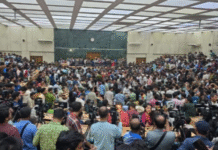The effect of partisan policing

In less than five days after the candidates officially hit the campaign trail on December 11, a number of opposition candidates—including prominent figures such as Dr Kamal Hossain, Mirza Fakhrul Islam Alamgir, Mirza Abbas and Reza Kibria—came under attack from their opponents, a trend that has since continued unabated.
This was partly because the police failed to ensure the safety of all candidates. In fact, some officers of the law enforcing force have appeared obviously biased against the opposition.
In Noakhali, for example, the police has drawn up a polling centre-wise list comprising of both the ruling party and opposition activists. The police plans to seek help from the AL men to maintain law and order while identifying the opposition activists as troublemakers who would be dealt with on Election Day. Also in Noakhali, a candidate (Barrister Mahbub Uddin Khokon) was even shot at by the police using rubber bullets. In Satkhira, a police officer publicly sought votes for the Awami League (and was subsequently withdrawn).
What’s more, the police has detained several opposition candidates under old cases, despite the fact that the norm is that candidates wouldn’t be harassed by the police after the announcement of the polls schedule.
Such a disappointing role of the law enforcement force has left an adverse impact on the electoral field. In normal circumstances, candidates would be out on the streets handing out leaflets as they meet and greet people. Instead, quite a number of opposition candidates have retreated from canvassing, with some confining themselves to their house or campaign headquarters in fear of being arrested and attacked.
True, there are reports that Awami League campaigns have also faced attacks, but not to the extent to be called widespread—far from it. In fact, several ministers and MPs continue to use state protocols including police protection. This has created a major imbalance between the two coalitions.
In Dhaka, the contrast could not be starker. For instance, Asaduzzaman Khan Kamal, the home boss who heads all law enforcement agencies, is ironically competing against BNP’s Saiful Alam Nirob, who is virtually on the run as he faces more than two hundred cases—the highest among all candidates. Nirob is yet to make a single public appearance, with the election less than a week away. This is, more or less, indicative of the situation in the capital.
A recent explosive report, titled “Ek Bhoyongkor September” (“A terrifying September”) dated December 20 by Prothom Alo explains why. The report makes for a compelling read and leaves little to the imagination as to how the police heavily engages in weakening the opposition camp. It points out that in September alone, the police in Dhaka filed 578 cases—mostly against opposition activists, accusing them of “exploding bombs”, “attacking the police” or “engaging in subversive activities”, among other things, despite the fact that the last few months have been mostly peaceful in Dhaka. Even during 2013-2015, when political mayhem was at its peak, the number of cases filed was not this high.
The reporters of the daily visited 34 places where the alleged offences took place but found not a single witness who would corroborate the allegations. While the top brass of the police wouldn’t comment on the story on record, at least one official privately acknowledged that these cases were outright fictitious.
“We have the list of BNP-Jamaat men of all areas [in Dhaka]. In addition, the police has developed a citizen information database, called CIMS, using which we can find out the detailed address of any person. We are using this to lodge new cases,” he explained as to how it worked. He also said that the police uses templates of charge-sheets and simply changes the name of the accused, date and the place to file new cases.
As if this wasn’t frightening enough, a lesser known news website, Sara Bangla, owned by a ruling party MP, has recently reported, citing anonymous sources, the police has prepared a list of individuals “who might take control of the polling stations.” The list mentions as many as 240,000 suspects whom the police plans to detain by December 27—three days before the election.
Later a report by Daily Jugantor corroborated the existence of such a plan, although it puts the number of suspects at 200,000. And unsurprisingly, most of these suspects are, by both accounts, opposition activists.
The terrifying nature of the plan aside, detaining 200,000 people at once doesn’t seem to be a realistic idea because our already overburdened jails have prisoners nearly three times their capacity. Nonetheless, detaining even a fraction of those so-called suspects will further impact electioneering.
The police’s choice of deadline—December 27—by which date it plans to neutralise those suspects is also intriguing. Earlier this month, AHM Mustafa Kamal, an influential minister and MP seeking re-election, asked the local opposition activists to flee from his constituency by December 27 or else face consequences including criminal cases.
“I’ll wait till the 27th. If they do not leave the area or reach a compromise with us by then, there will no longer be any concession,” he was seen telling his supporters in a video clip that subsequently went viral and was widely reported on by the media.
This suggests that the prospect of a major “combing” operation targeting mainly the opposition before the election is likely. And what has the Election Commission done to avoid a disaster that would be followed by the crackdown? So far, the commission has ordered four police officers-in-charge to be withdrawn, apart from delivering frequent sermons.
If the EC cannot assert its authority over the police, so much so that it is free from the partisan government’s control, the prospect of a free and fair election will remain bleak.
Nazmul Ahasan is a member of the editorial team at The Daily Star. His Twitter handle is: @nazmul_ahasan_









